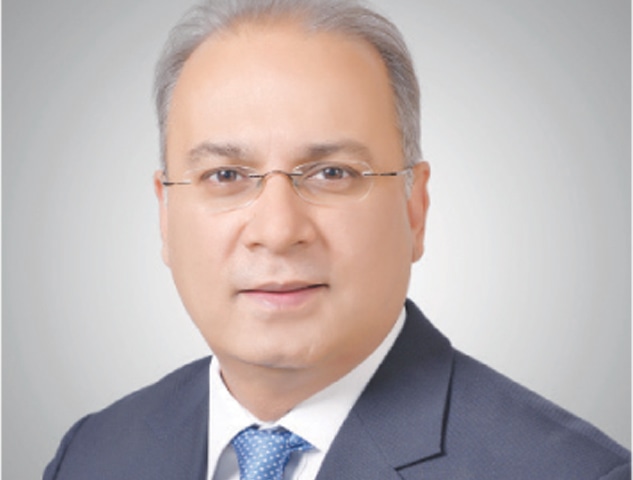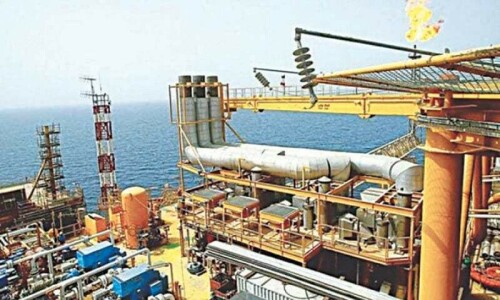
Established in 1999, Engro Polymer & Chemicals remains the monopoly producer of Polyvinyl chloride (PVC) in Pakistan even after two decades. Until last year, EPC had a 70-75 per cent market share across the country, which it has increased to 93pc with the commissioning of its new plant. The rest of the market need is filled by cheaper but hazardous plastic waste imports.
PVC resin is the raw material mostly used in scores of construction-related plastic applications ranging from pipes to electricity cables to window profiles to doors. Depending on its usage, its applications form 3-6pc of the total construction costs.
“PVC as a material plays an integral part in the construction industry with 70pc of EPC production going into the construction sector where grey structure applications like pipes, cables, ducts and flexible hoses are part of grey structures. Recently, with the new developments in the industry, multiple applications have been introduced for interior structures as well. These include PVC wall panels, PVC board, vinyl floorings, Wood Plastic Composite doors, profiles & windows,” EPC chief executive officer (CEO) Jahangir Piracha said in an interview last week.
Ever since its establishment, the company has always tried to stay a few steps ahead of domestic demand, which has grown at a steady pace of 6pc a year. “The current domestic demand for PVC is 250,000 tonnes. We have recently expanded our capacity to 300,000 tones with excess capacity being exported to Turkey and the Middle East. Our local customers are our priority and we export excess production only till local demand catches up,” he said.
ECP chief attributes success to the global commodity price cycle, the addition of new capacity, price discounts/promotions and efficiency savings on the new plant
The downstream industry prefers to buy its raw materials from EPC rather than importing because of a number of reasons. First, EPC offers very competitive prices making imports unattractive. Two, it can deliver orders in no time while imports take 2-3 months.
“People can import PVC but it is advantageous for them to buy from us. We provide directly to our customers who include small, family-run businesses to large cable companies,” Mr Piracha said.
EPC earnings for the first half of 2021 to June have grown to Rs7.3 billion with EPS coming at Rs8.01. The second-quarter earnings remained below the expectations of market analysts as its topline dropped 5pc quarter-on-quarter owing to lower than expected sales volume and prices because of the resurgence of the fourth Covid wave in the country.
Mr Piracha says a combination of factors have contributed to the firm’s success, including the global commodity price cycle, the addition of new capacity that helped raise the company’s market share from March onwards, price discounts and promotions to boost sales amid pandemic, and efficiency savings on the new plant.
The recent construction and housing revival on the back of tax amnesty and waivers given by the government is another factor behind the PVC demand growth in recent months.
“We are witnessing growth in demand since March as construction activity picks up, especially in Punjab and beyond it. The additional growth has created thousands of jobs in downstream industries, including PVC. Our customers, small and large both, are making investments and expanding their capacity because of demand growth, which shows the construction boom. Then we also have new DHAs coming up in Multan, Quetta and other places, which is also boosting our sales.”
Value addition: In spite of its being the only producer of PVC, the company has consciously kept from entering the downstream, value-added industry. “We think our entry into the downstream industry would mean us competing with our customers. We don’t want to do that. We want to help our customers grow bigger. But definitely, we can think of entering into specialised applications, not for profitability, but to encourage their local production,” Mr Piracha argued.
Pakistan’s current per capita consumption is 1.2kg versus the global average of 6kg and Piracha feels that there is a large room for growth. “We strongly believe that PVC is the material of the future and is a sustainable substitute for wood which is used for doors and windows etc and in turn can help us save our forests.”
“PVC is not single-use plastic material. In construction, it goes under the structure for 40-50 years and still can be reused. The single-use plastic is only 7pc of our production. That is used in water bottles, wrappings etc and are recyclable.”
EPC is also working on three sustainability streams, which include carbon reduction and offset, resource conservation and circular plastics. “Sustainability is a major responsibility and with the global emphasis on sustainability companies that do not align themselves as sustainable producers may face dire consequences. We have projects that have been identified in these streams that will not only make our production process more resource-efficient but also we want to work on circular plastics so that end to end operation is sustainable.”
The firm has launched pilots in 3-4 cities to collect and recycle plastic waste and help create recycling plants and companies. “Pakistan needs to clean up its house before importing hazardous junk, including hospital and bathroom waste, from abroad. We don’t want the government to ban waste. But we want it to apply laws to ensure that others don’t dump hazardous waste here. The exporter should certify that they are sending only non-hazardous waste according to the international conventions,” the CEO insisted.
The group is assessing the establishment of a Propane dehydrogenation (PDH) plant to manufacture 750,000 tonnes per year of polypropylene at a cost of $1.5bn plus investment. It will be the first of its kind in South Asia. India is the only country in the region that produces polypropylene at its crackers and refineries. Pakistan imported 503,572 tonnes of polypropylene in 2020, mostly from the Middle East.
Policy framework: Piracha elaborates that the industry’s primary ask from the government is a consistent petrochemical policy. “At the moment we do not have a long term petrochemical policy. Currently, we are a growing market with our per capita plastic consumption of 8kg versus global 55kg and India’s 13kg. Investment in midstream products can be around $2-3bn in the medium term and to facilitate the growth we need a holistic policy framework.
“Historically, Pakistan has only been able to attract large scale investments under holistic policy frameworks. Notable examples include fertiliser, power, petroleum, and auto policies, which collectively attracted more than $10bn of investment. Countries without petrochemical feedstock advantage have been able to develop petrochemical sector only by providing consistent and long-term policy support to the petrochemical sector,” he argued.
Published in Dawn, The Business and Finance Weekly, October 4th, 2021









































Dear visitor, the comments section is undergoing an overhaul and will return soon.